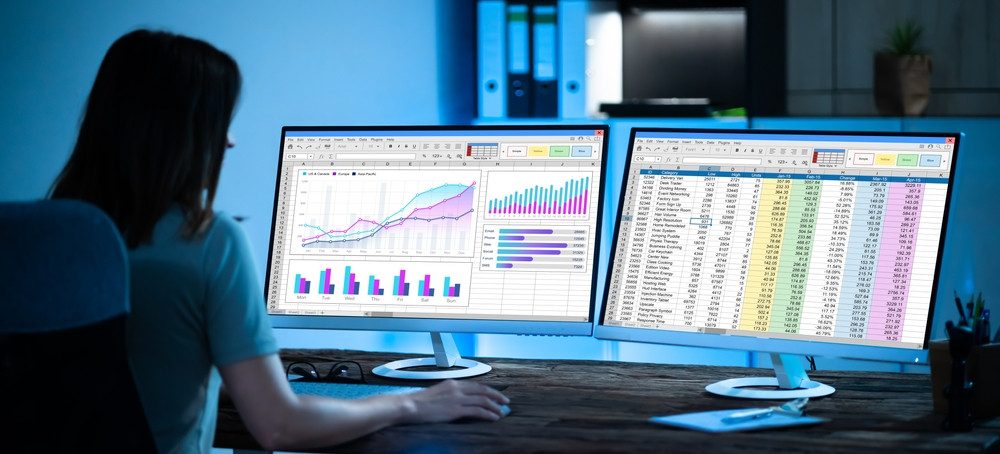To become a data scientist, you need to master technical and professional knowledge in many different professions.
This work combines information science, business strategy, and math. This complex skillset forces scientists to constantly hone and learn to keep up with the advancement of technology.
It is also the reason why this profession is in high demand and has good pay compared to other occupations. So many people want to learn this job.
How to become a data scientist? The workflow includes 4 steps as follows.
- Obtain a relevant certificate or master’s degree.
- Practice and learn the necessary skills.
- Get an entry-level job.
- Prepare for portfolio and interview.
To learn about the details of each step and other useful information about this job, let’s explore right now!
What Is A Data Scientist?

A data scientist is a person who specializes in gathering and analyzing information to conclude. They use a variety of techniques to do that.
Data scientists are also the creators of algorithms to summarize and derive useful information or patterns for statistical purposes. As a result, they can recommend useful changes to the business.
Television or telecommunications companies can apply this technology to analyze and predict customer decisions.
Thanks to this useful data, businesses can draw lessons to adjust their marketing strategies or products to entice customers.
What Does A Data Scientist Do?

Data scientists are tasked with identifying a question their teams need to answer and using the information to answer that question.
They will create diagrams for forecasting and hypothesizing purposes, thanks to the analysis.
An data scientist’s day-to-day duties may include the following:
- Discover insights by looking for patterns and trends in the information set.
- Improve the quality of product information and services through machine learning models.
- Predict outcomes by creating information models and related algorithms.
- During analysis, deploy informational tools such as R, SQL, Python, or SAS.
- Stay up to date with innovations in technology and machine learning.
Salary and Job Growth

According to our latest report, the base annual salary for data scientists is $124,540. However, as the size and area of the business grow, this number could increase even higher.
In addition, this profession has other additional factors that determine the salary level. These include their experience, education, certifications, and importance to the business.
The Bureau of Labor Statistics shows a few areas where wages and hiring needs outperform other states. These include the District of Columbia (plus Virginia and Maryland), California, Washington, Illinois, New York, and Texas.
Over the past decade, this job has remained one of the most in-demand professions. Even in 2024, this situation will not stop.
More and more businesses need to understand information and analyze it. All the big organizations like Google, Amazon, or Apple make decisions based on data.
How To Become a Data Scientist
This job is truly fascinating and comes with many benefits and future growth possibilities. So, how do you become an information scientist?
To qualify for this job, equip yourself with the following knowledge:
1. Earn A Data Science Degree
The preparation step is always one of the most important. Future scientist will need a clear career path.
According to the State of Data Science, 68% of scientists have college degrees. If not, you’ll need to take online courses to get the relevant certifications.
Being prepared in advance will make your learning process easier.
You can start by becoming proficient with popular programming languages like Java, Python, or R. In addition, knowledge of probability and statistics gives you a better start.
Exposure to knowledge early on can also help you determine if this job is right for you.

2. Sharpen Relevant Skills
To be able to become a professional and excellent scientist, you must possess some relevant skills as below.
Programming Languages
This information analysis relies on several specialized programs and tools for data cleaning, research, and modeling purposes.
To be able to do that, they need to have basic knowledge of popular programming languages. It will make the process of sifting, analyzing, and managing large amounts of information easier.
Python, Hive or R, and query languages like SQL are the most notable programming languages.
The R and Python languages can help users build predictive models of unknowns and analyze behavior. Additionally, they allow them to produce information in user-friendly forms.
RStudio Server is one of the most important tools for data scientists. This software supports the development environment for them to work with R on the server.
Another popular application is the Open-source Jupyter Notebook which helps users in statistics, machine learning, and viz data modeling.
Data Visualization
One of the most important tasks of scientists is the ability to create visual charts and graphs. It will make decoding and analyzing information easier and more observable.
Specialized applications for doing this are Excel, PowerBI, and Tableau.
Excel is a great piece of software that you can take advantage of at this step. Although its underlying technology is very basic, the application of these spreadsheets is extremely durable.
Machine Learning
Data science has a very close relationship with machine learning. The tools apply artificial intelligence to give systems the ability to learn and become more precise without the need for explicit programming commands.
Applications play an important role in serving the machine learning process.
Trained artificial intelligence can do many complex operations, such as translating or displaying personalized articles on social networks.
Data scientists can choose between tools like Apache Mahou, h2o.ai, Accord.Net, and TensorFlow, depending on their business needs.
Big Data
Some employers prefer to choose candidates who have long experience with big information. Rely on some software frameworks like Apache Spark and Hadoop to handle them.
Communication
Without excellent communication skills, data scientists will not be able to make business-changing decisions.
You need to be able to share ideas and judgments orally and in written language with your colleagues. Over time, you will learn this skill naturally.
Don’t worry; start small or give a presentation in front of your loved ones. Then you can speak in front of the crowd.

3. Get An Entry-Level Job
Companies have a lot of vacancies for entry-level information science jobs. They can train professionals more suited to the company’s needs and business lines.
When looking for these entry-level jobs, certifications related to the data field can be helpful. Typical examples are facility management systems, information visualization, and business intelligence applications.
Before you begin this process, make sure you practice and hone the above skills. They will make it easier to get used to the job.
You should also demonstrate your knowledge with a complete portfolio. Consider showing your work on GitHub instead of your own website.
This community easily allows other users to access your profile and performances. This place also demonstrates the ability to communicate to verify that you are proficient in soft skills.
Since this is a fairly broad profession, you can approach it in many ways.
4. Prepare For Interviews
Never include your entire job in your CV when applying for a specific job. Instead, highlight only a few areas that are most closely related to the job you’re looking for.
Selecting, highlighting, and presenting a focused CV will show your ability to deal with information.
If the employer is impressed with your resume, prepare for the interview round.
This position requires quite a bit of technical knowledge. So you may be faced with technical and behavioral situational questions.
Some questions you may encounter include:
- What is Random Forest?
- To find out all duplicates in a dataset, how should you use SQL?
- What are the advantages and disadvantages of the linear model?
- Please describe your experience with machine learning and its related applications.
You should be prepared for these questions. To practice at home, try saying the answer yourself aloud.
In addition, the knowledge and experience from the past is also a great plus point for employers. It would help if you focused on strengths closely related to the job you are applying for.
FAQs
Continue reading below if you want to know more useful information about information analytics specialists. Let’s explore together.

How Long Does It Take To Become A Data Scientist?
There are many paths to becoming an data scientist. Depending on the choice of each individual, the time they spend will vary.
Those who choose to go to college can take three to four years to become full-fledged scientists. About a quarter of them will decide to get a master’s degree and spend an extra one to two years completing the program.
Thus, the total time for a training path will last from five to six years.
A shorter and quicker method is self-study. However, not everyone commits to accomplishing this.
Most people are distracted and can delay their journey indefinitely.
For better self-education, join data scientist boot camps. These programs will last from 12-15 weeks up to six months.
The boot camp route may be the shortest route to becoming a scientist.
Is It Hard To Learn Data Science?
Because of the nature of the job, information scientists often have to work with technical knowledge and factors. Compared to other tech jobs, they require more skills.
One of the most important requirements is a solid knowledge of many different programming languages and applications. It will take a person quite a while to reach this level.
This reason partly explains the shortage and the need to find data scientists globally today.
Are Data Scientists In Demand?
Currently, the gap between supply and demand for this job is huge. Most of the students who graduate find employment quickly.
In the United States, there is a need for more than 150,000 data scientists. Europe and Asia are no exception.
Each company has a unique information practice and complexity. It makes finding the right expert even more difficult.
This work has a parallel development with future scientific and technical results. Therefore, its demand will increase even more strongly.
According to the US Bureau of Labor Statistics predictions, job outlooks could increase by 22% within ten years (2020 – 2030). This number outperforms every other profession.
What Is The Data Scientist Career Path?
The starting point for most data scientists is data technicians. After gaining more experience, they will continue to move into the role of scientists through job changes or internal promotions.
Over time, these people will have the opportunity to become seniors in their fields. Salary and responsibilities will also increase.
Those with management skills can go on to be promoted to Director of Data Science or equivalent executive levels.
What Skills Do You Need To Become A Data Scientist?
Each profession will have different specific requirements. As they become more saturated and aged, more specialized needs emerge.
Data science is no exception. However, no matter what level you are at, you need to possess the following basic skills:
- SQL
- Programming in Python or R
- Solid understanding of statistical probability
- The media
- Data visualization
- Building and optimizing machine learning models
All scientists need to possess this basic knowledge. However, depending on the specific subdomains of machine learning, they will need to focus on one aspect.
Some tasks may require in-depth experience with production-ready prediction algorithms. Meanwhile, others focus on Natural Language Processing (NLP).
Conclusion
Learning data science-related jobs is not a simple matter. You will need a lot of determination and motivation to persist in pursuing it to the end.
However, the results you get are extremely well worth it. Continue to build projects and share them with the community to practice skills and learn more expertise.
Hopefully, this article has somewhat helped you understand the career roadmap. Don’t forget to share it with your loved ones if you find them useful.
Thank you for reading!
